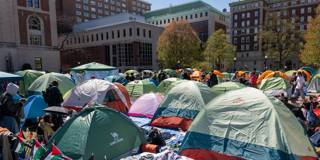
The Primacy of Political Order
Chile’s recent experience, in which the popular protests and left-wing agitation of 2019 have given way to a wave of reaction, shows that progressives do not always grasp the obvious that people’s right to personal safety comes first. After a spring of widespread campus protests, the US could experience a similar political swing.
LONDON – He is the unlikely protagonist of a wannabe blockbuster: a balding, pudgy, jug-eared shopkeeper. The plot is just as unlikely: outside, the young protesters marching down the avenue clamoring for equality and freedom; inside, the middle-aged sandwich-maker struggling to keep his shop from being vandalized yet one more time.